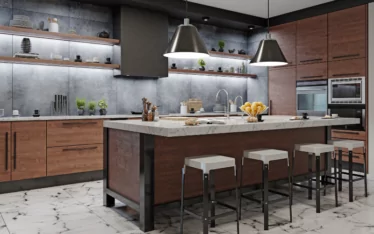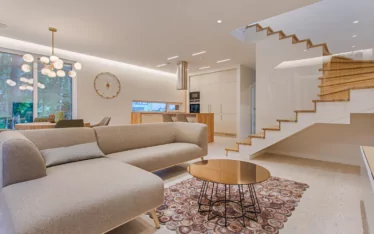Disclaimer – We at Evolve are manufacturers of decorative surface coatings. Our blogs are for reference purposes or educational purposes only. We do not manufacture tiles. Please visit our products page to learn more about our offerings and services.
Tiles are the most popular flooring in a layman’s world and are most commonly used for flooring in kitchens, bathrooms, parking lots, rooftops, dining areas, and offices. They are usually made from materials like ceramic, glass, porcelain, metal, or stone. Each of these tile categories offers a significant range of design flexibility, size options as per your home interior design, and alluring aesthetics to cozy up your space.
If you are looking to renovate your home, and are having a tough time with your flooring tile selection, then don’t worry! In this article, we’ll walk you through some of the most popular floorings that you can consider for your next project. So let’s dive in!
1. Ceramic Tiles
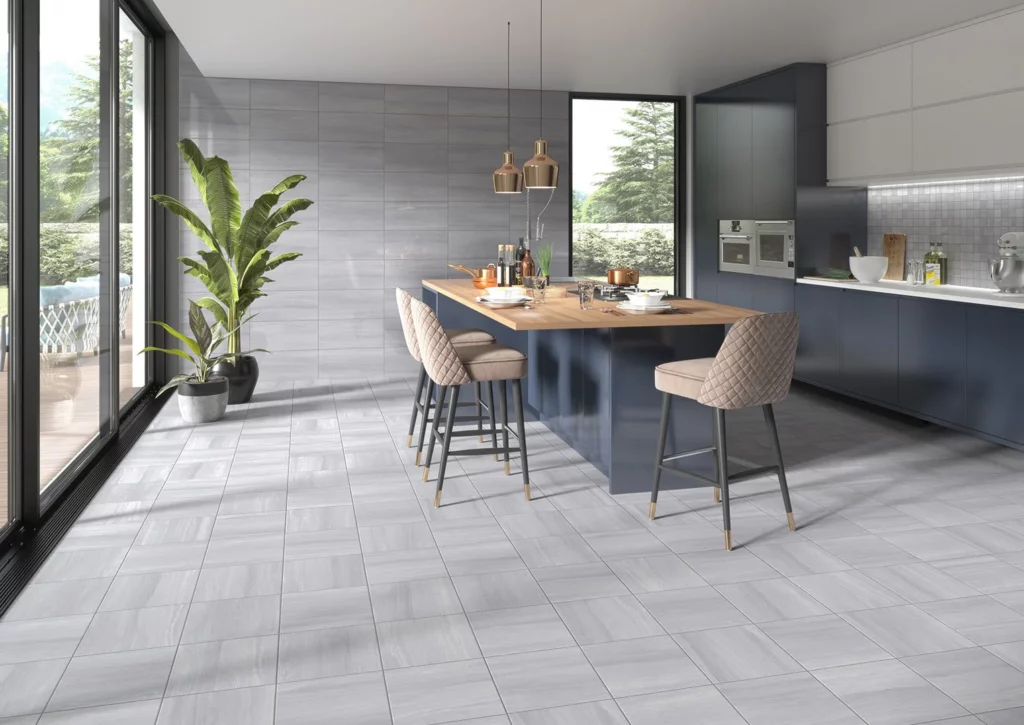
Ceramic tiles are the most familiar name when it comes to home flooring. Manufactured using a combination of earthen clay and water, the tiles are then coated with a glaze to give them smooth edges and make them non-porous. Widely available in the Indian market, ceramic tiles are an affordable option and have a remarkable natural appearance, making them one of the most popular options among home interior designers. It’s often seen that matt-finished ceramic tiles are largely preferred for indoor spaces as they lend a soft elegance to the interior aesthetics.
Pros:
- Available in a wide variety of finishes like glossy, matt, super glossy, or metallic sizes, and countless colors such as greys, whites, beige, brown, and more.
- They offer full design flexibility and are also easily available across the country.
- They are anti-slippery due to the layer of glazing coat that provides additional safety for homeowners
- Ceramic tiles can withstand heavy footfall since they are manufactured in a kiln at high temperatures, making them highly durable.
- They are easy to clean and maintain and do not suffer much wear and tear at home.
- The extra-glazed ceramic tiles tend to last longer (about 10-15 years when used with proper maintenance.)
- They are a bonus for homes with warmer climates as they do not heat up easily.
- The ceramic tiles can also be self-installed as they tend to be softer and can be cut with basic cutters when compared to porcelain tiles.
Cons:
- There are high chances of breakage owing to the inherent brittle and hard nature of ceramic tiles
- Larger ceramic tiles can be more difficult to transport and install, demanding more work while laying thus making them labor intensive
- Ceramic is a cold material by nature, hence it remains cold during winter and would not provide any insulation to the feet.
- Ceramic tiles naturally have a hard surface area, resulting in it being difficult for humans to stand on them for a prolonged period.
- They are more porous when compared with porcelain tiles
Price range: On average, ceramic tiles cost from Rs. 34 to Rs. 356 per square foot. The installation charges are applicable additionally. The most common tile sizes available on the market are 200 x 300 mm, 300 x 600 mm, and 600 x 600 mm.
Best suited for: They are well suited for bathrooms, kitchens, swimming pools, rooftops, terraces, and swimming pools.
2. Porcelain Tiles
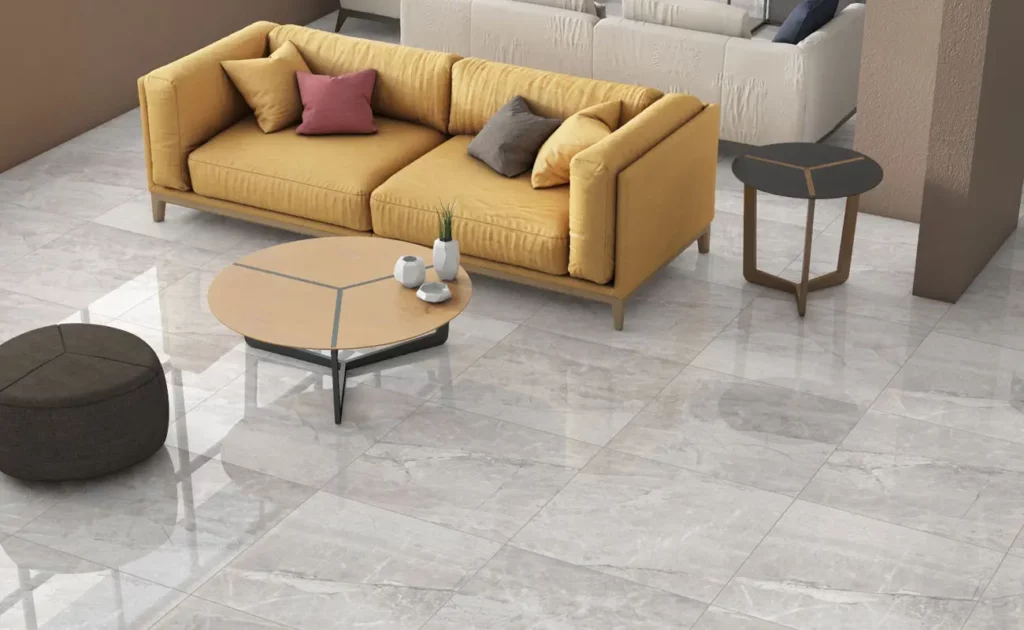
Since we’ve already explored ceramic tiles, let’s compare them to porcelain tiles. Porcelain tiles are comparable to ceramic tiles in appearance, but they are less dense, which means they are naturally tougher and absorb less water. They are most suited to high-traffic areas in residential projects and are more expensive when compared to ceramic tiles.
Pros:
- Porcelain tiles are fired at a high temperature, thus lending them a solid color that gives them a more earthy appearance.
- They are often chosen for kitchen countertop surfaces because of their capacity to withstand heat.
- IIts ability to withstand moisture makes it a practical alternative for use in wet areas like restrooms as well as high-traffic areas like patios and entrance spaces
Cons:
- They are more expensive than ceramic tiles.
- Porcelain tiles being harder than ceramic tiles, require more time and effort while installation
- They are available in very limited colors and simple designs restricting the designers from expressing their creativity.
- They are more brittle than ceramic tiles.
Price Range: Porcelain tile slabs range from around Rs. 60 to Rs. 100 per square foot.
Best Suited For: These can be used for areas such as kitchens, front entrances, and bathrooms.
3. Vitrified Tiles
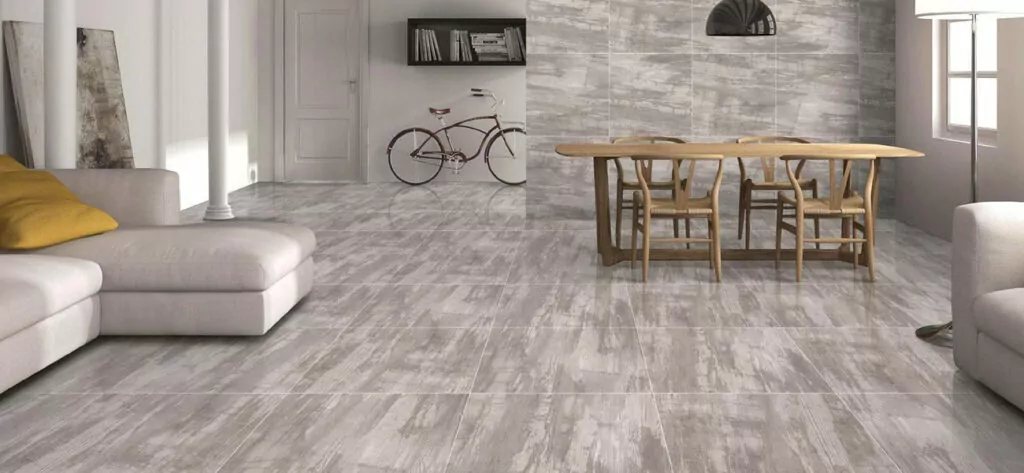
Vitrified tile is a type of ceramic tile with an extremely low porosity. They are a popular alternative to granite and marble flooring. These tiles are manufactured using hydraulic pressure and a combination of clay, silica, and quartz, giving them a vitreous sheen
Pros:
- They are strong and durable with 10-12mm thickness, which is almost close to natural granite and marble stone and can be used in high traffic area
- Vitrified tiles are easy to clean and do not need constant surface polishing.
- They are also scratch and stain resistant.
Cons:
- These tiles are more expensive than porcelain or ceramic tiles.
- They are not an environmentally friendly option as the making process leads to high carbon dioxide emissions
- While installing, they should be carefully placed as the edges might get chipped as they are prone to breakage.
- The installation cost is expensive as the placements need to be even, and thin along with neat joints.
Price Range: A 600 x 600 mm can cost you around Rs. 42 per square foot whereas a 300 x 300 mm can cost Rs. 32 and above
Best Suited For: You can use these tiles for areas with heavy traffic as well as kitchen and bathroom floor
4. Glass Tiles
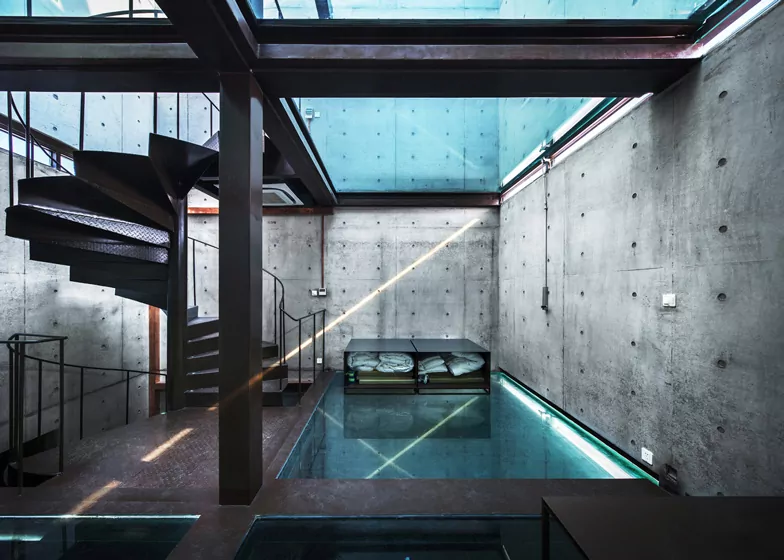
Glass is an alluring element in the interior world. It can not only lift up the entire space with its transparency but also add character and depth to the overall space. We’ve all seen glass being used to make doors and windows, but have you ever wondered how glass can be incorporated as a floor tile?
Glass tiles are manufactured by framing small bits of 1 mm thickness into consistent shapes to make them 25 mm in thickness by gluing them to a mesh tile. The three basic types of glass tile you can readily get in the market are cast glass, fluted glass, and coated glass. While they definitely add a luminous character to any space in an instant, they can be heavy on the pocket and also difficult to maintain.
Pros:
- Glass tiles are stain-resistant, debris resistant, and easier to clean.
- On a sustainable note, glass tiles are 100% recyclable since they can be melted down and reformed to any desired shape.
- They provide an unmatched aesthetic appeal, adding value to your real estate price.
- For tighter homes, they are a blessing as they make any space appear larger and allow sunlight and wind to come through.
Cons:
- One of the biggest drawbacks of using glass tiles for flooring design purposes is the high price. If you’re tight on budget, this might not be an ideal option for your project.
- Installing glass tiles can cost a fortune as they require professional fittings and skilled labor work.
- Glass tiles are mostly available in limited shades, hence if you are looking out for a peculiar color then this might not be the right tile.
- While they are resistant to stains, these tiles are easily susceptible to scratches. Over time scratches are bound to accumulate on these tiles and after several years they will need to be replaced. And the replacement of these tiles is not an easy job either.
Price Range: Approx Rs. 150 per square foot
Best Suited For: Hallways, entrance hall, bar areas, and double heightened rooms where an internal courtyard look needs to be provided.
5. Stone Tiles
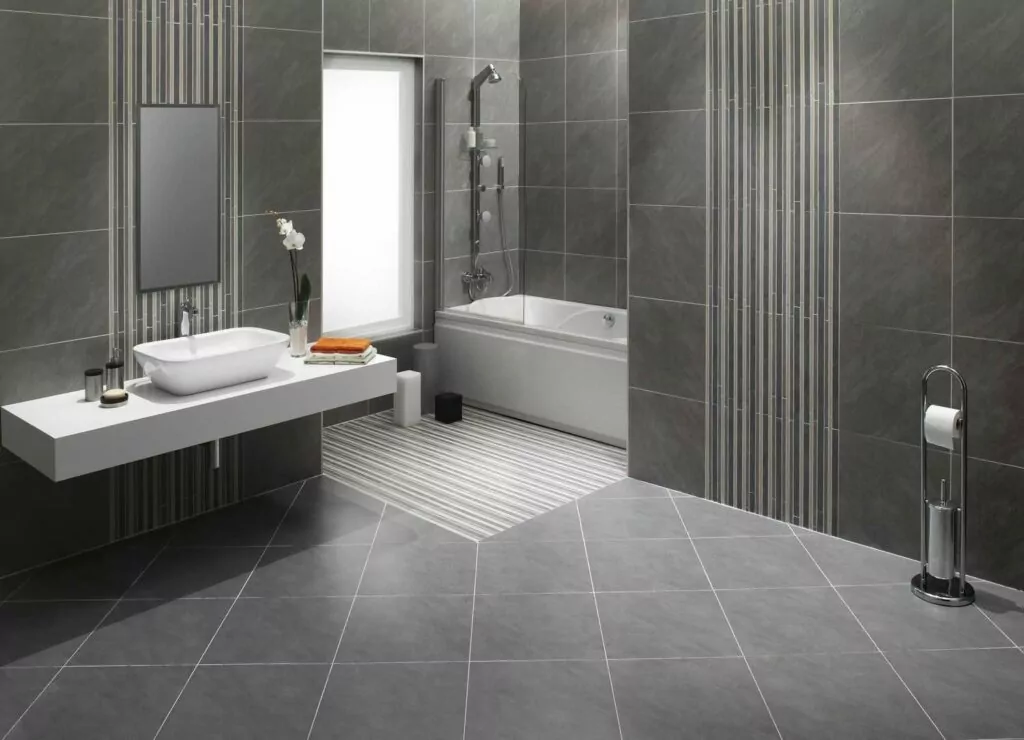
Commonly made from marble, granite, limestone, sandstone, and other minerals, stone tiles are an ideal material for homes in warmer climates. Being a hard and cool material, they not only help keep your interiors cool but also add a sense of comfort and tranquillity to your home. In the flooring market, stone tiles are often replaced with artificial stone flooring. So one must be mindful of its authenticity. If a natural, warm look is what you’re looking to achieve, stone tiles can be an ideal pick
Pros:
- Stones are naturally sturdy and long-lasting and can be used for both – the interior and exterior areas of your home.
- Being a natural material, stone tiles are resistant to dust and allergens, thus making them safe and durable
- They are available in various categories such as Marble, Granite, Sandstone, Limestone, Slate, and Kota stone
Cons:
- They also come with a hefty price tag since these natural stones are extracted from nature, and are cut or customized according to the client’s needs and dimensions
- They are brittle and can easily break thus requiring extra attention during transport and installation
- Polished stones such as marble or granite can get scratched easily on impact with a sharp and heavy object
- Over the years, with constant use in wet areas, like bathrooms or kitchens stone tiles can become slippery, unless they are treated with an anti-slip coating.
- They can stain when exposed to water
Price Range: Rs. 30 per square foot and above
Best Suited For: Living rooms, bedroom flooring, study rooms, terraces, outdoor patios, break areas, or even for bungalows and villa exterior
6. Marble Tiles
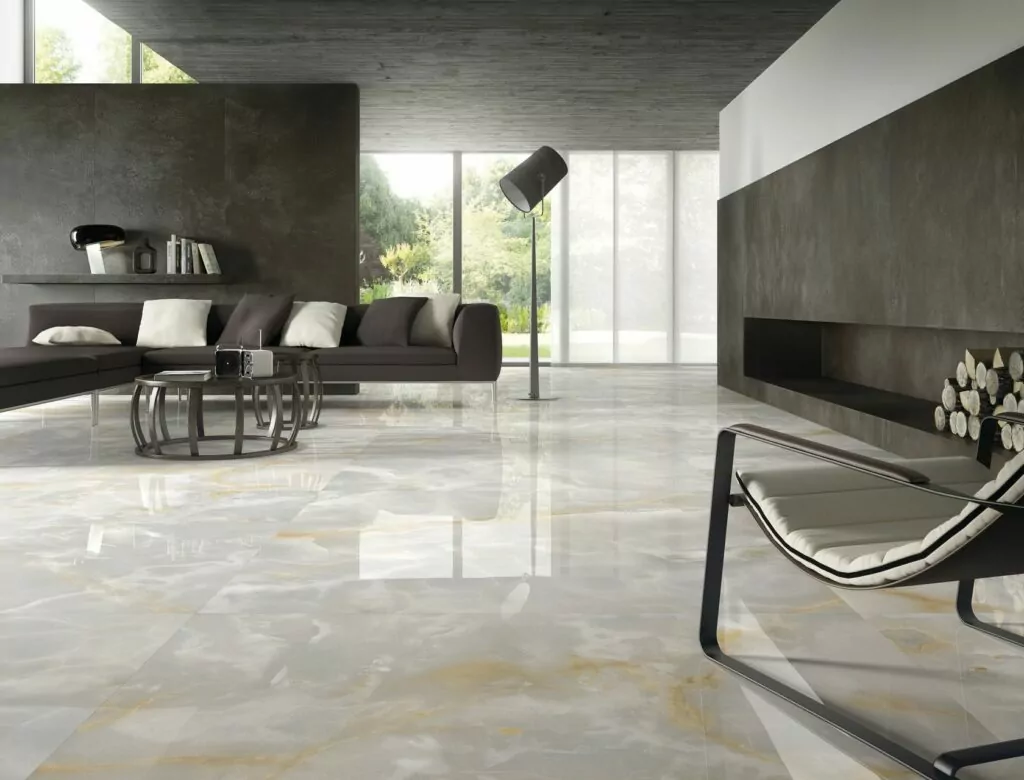
For decades, marble has been a favorite building material. The name itself exudes opulence! Over the years, this elegant material has been widely utilized in palaces and prominent structures such as the Taj Mahal. They are mainly valued for their natural beauty and are therefore classified as premium flooring materials.
Marble flooring is further subdivided into two types: slabs and tiles. Marble slabs are sourced from a quarry in their natural state and cut into the required shape. They come in a range of colors, such as white, beige, and yellow. Marble tiles, on the other hand, are mass-produced and have a uniform size and texture. The production procedure is the primary distinction between these two categories.
Pros:
- Being a natural stone, every marble tile has a unique appearance thus helping you achieve a bespoke look for your floors
- Marble tiles have an elegant appearance that makes even the simplest of spaces look premium with absolute ease.
- These tiles can be polished to achieve a glossy look. And if the shine fades over the years, polishing them again is an easy task
- They also provide coolness during summer as they do not heat up quickly.
Cons:
- Marble is a porous stone and thus requires proper sealing before being used for flooring purposes.
- They are prone to scratches and can stain easily.
- Even when one marble tile comes in contact with the slightest water, it can lead you to slip and fall, hence you need to take extra care especially when the house has kids and pets. Marble tiles are extremely slippery as well as brittle. Even the smallest drop of water on properly polished marble floors can lead you to slip and fall, which can in turn cause fractures in the floor.
- They lay on the higher budget end than most other flooring tiles.
- The installation of marble tiles needs skilled expertise as the material requires utmost care during transportation, cutting, laying, and finishing.
Price Range: Rs. 8 to Rs. 200 per square foot.
Best Suited For: A well-sealed marble can be used in wet areas of your home like kitchens, bathrooms, and laundry rooms whereas regular marble can be used throughout your homes and apartments for a luxurious vibe.
7. Wooden Tiles
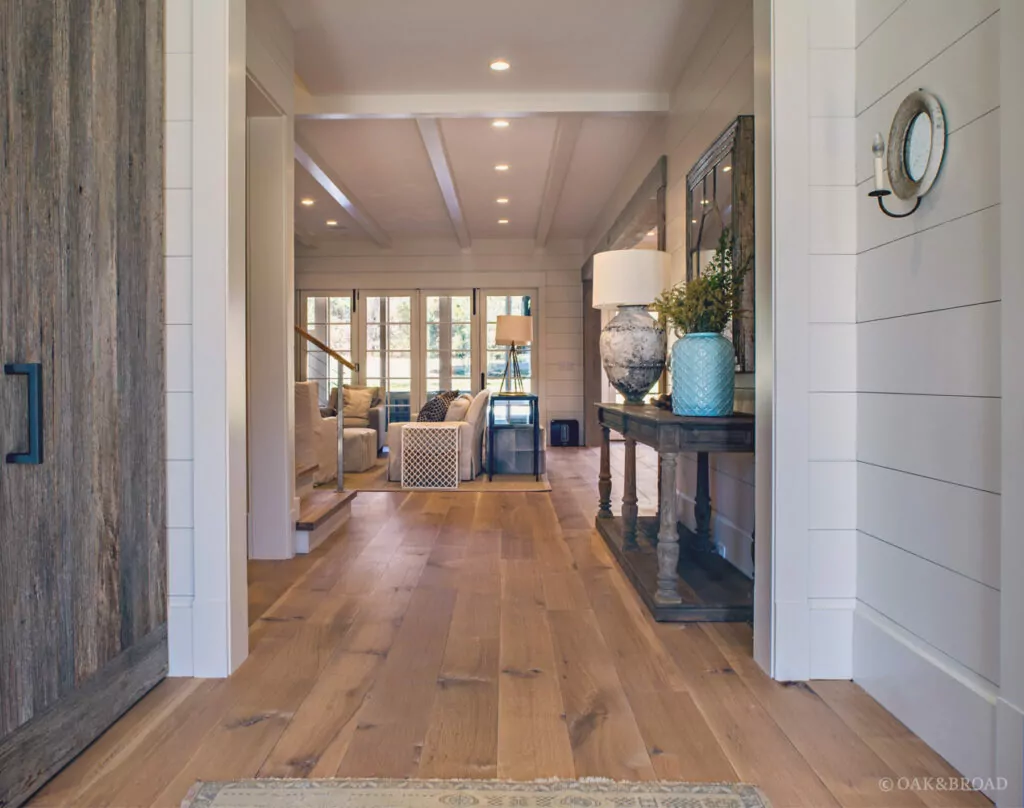
When we think about wooden floors, we imagine ourselves in a pleasant home by the fireplace, enjoying a mug of coffee. However, hardwood flooring is expensive and not quite environmentally beneficial because it necessitates the sacrifice of trees. So, what are your options? The solution is to use wooden tiles!
A wooden tile is a cement tile that has been given a wood-like appearance through artificial means. Because of cutting-edge technology, the finished product is so lifelike that it is nearly impossible to tell it apart from a real piece of wood.
They offer more advantages than wooden flooring and are ideal for warmer climates where the client intends to install wooden flooring. Furthermore, they do not leave a hole in the pocket.
Pros:
- They are easy to clean, long-lasting, and provide a unique appearance.
- Wooden tiles can even be used in wet areas, unlike wooden flooring which absorbs moisture.
- These tiles are also easy to install and are budget-friendly.
- They can possess the look of oak, teakwood, etc without buying the actual product.
- It is difficult to scratch or stain them.
Cons:
- They are pricey compared to ceramic tiles
- Tends to feel colder on the feet
- Hard surface finishing makes it tough on the feet
- The tile layering can be hard if you want to achieve a real wooden flooring look.
Price Range: Rs. 400 to Rs. 1500 per square foot
Best Suited For: Colder regions where your feet won’t catch a cold. Overall, they are a classic choice for living rooms and bedrooms and lay a perfect foundation for a cozy interior design. Owing to their low water resistance, it is better to avoid using them for wet areas like bathroom floors, kitchen floors, etc.
8. Cement Tiles
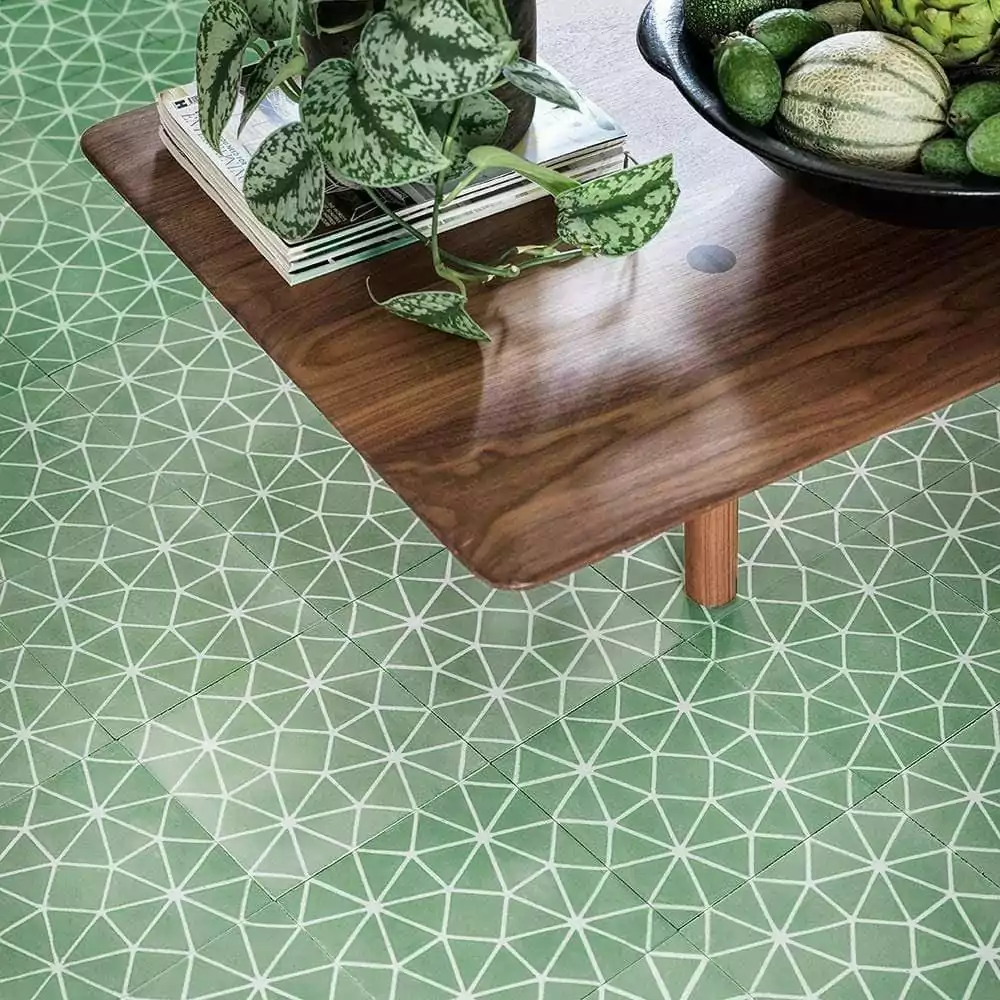
Cement tiles have been a popular flooring material since the 1860s and for good reason of course! Manufactured using a mixture of cement, sand, and color pigments under hydraulic pressure, these are one of the most practical and durable types of tiles. Homeowners as well as interior designers love cement tiles for their bright patterns, versatility, durability, and quirky appearance.
Pros:
- Cement tiles are highly durable and with proper care, they can last a lifetime in your home
- Ranging from floral to abstract, they come in a wide variety of design and color options making them an easy pick for all kinds of spaces
- These tiles are handcrafted using natural materials and are thus an environmentally friendly product.
- They are slip-proof and are less prone to accidents.
Cons:
- They are highly porous and prone to molds or milder formations. Hence proper sealing is absolutely necessary when using them for flooring purposes.
- They are not recommended in colder regions as they are not good insulators
- When it comes to their finishing, these tiles do not give the same sheen as other tiles we have mentioned above.
Price range: Rs. 140 per square foot to Rs. 195 per square foot for printed tiles.
Best Suited For: Living rooms, entrance spaces, kitchens, or even private spaces such as bedrooms, libraries, and study areas.
Finding the perfect flooring material from the plethora of options you have in the market can be a daunting task. So, how do you choose the ‘one’? It’s simple, choose the material that best suits the needs of your home and fits into the environment perfectly. And if you’re looking for other flooring ideas that are not tiles, check out this blog.
Note: We at Evolve manufacture exquisite surfaces in the form of wall panels and door skins which can be supplied to projects globally. We are based out of Mumbai, India, and have catered to projects nationally as well as internationally including Dubai, Kuwait, Bahrain, Riyadh, Italy, Kuala Lumpur, and Malaysia. Our specialty is working with new-age building materials like liquid metal, decorative textured concrete, and paintable corten steel.
We work with architects, interior designers, fit-out contractors, furniture manufacturers, and new homeowners. And are always on the lookout to collaborate with potential stockists and retailers worldwide.
If you are looking to source unique surfaces for your interior design projects fill out the form below to receive our e-catalog.





